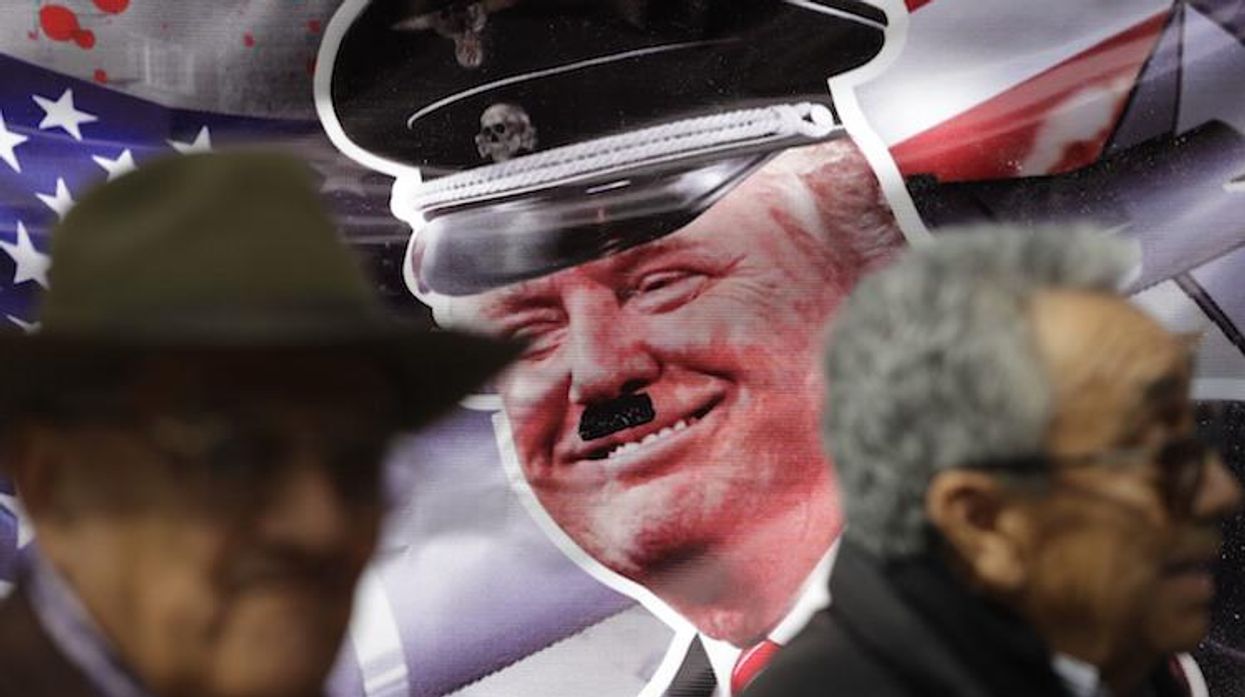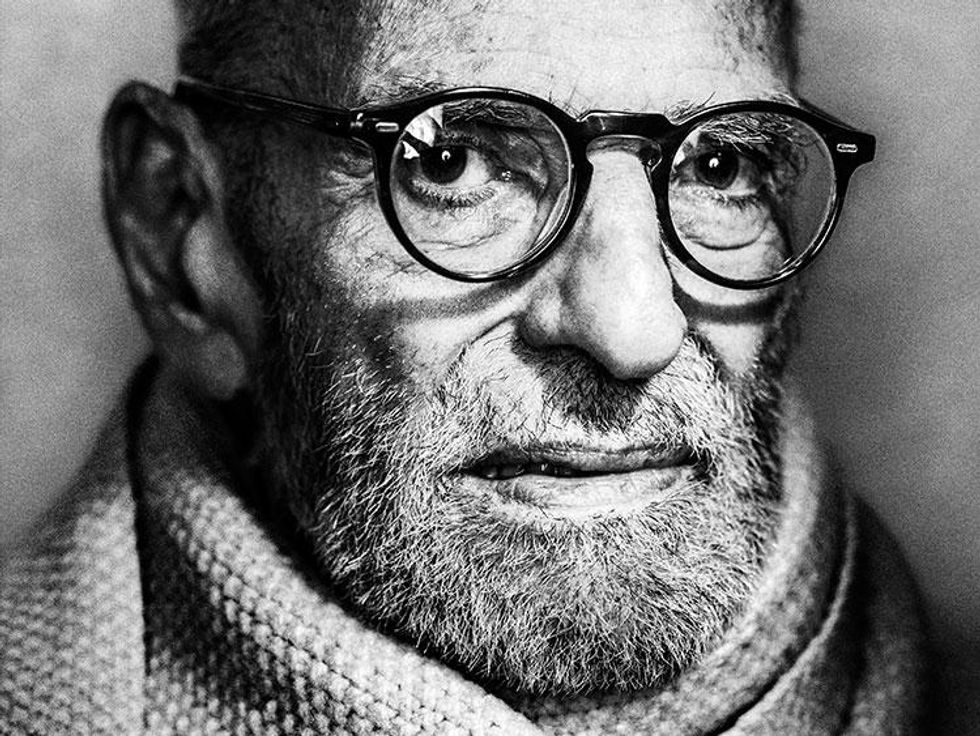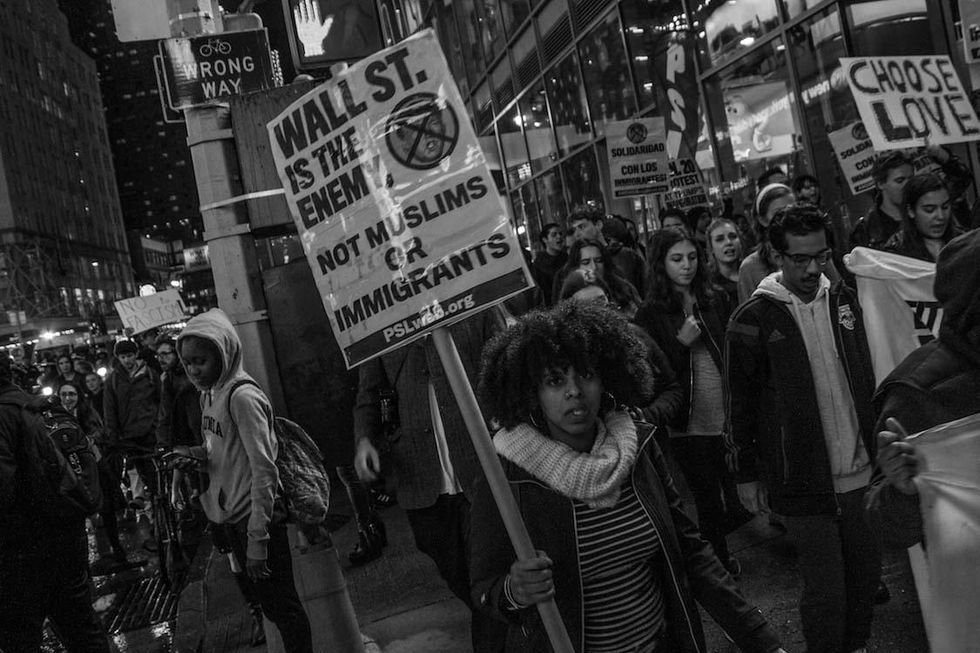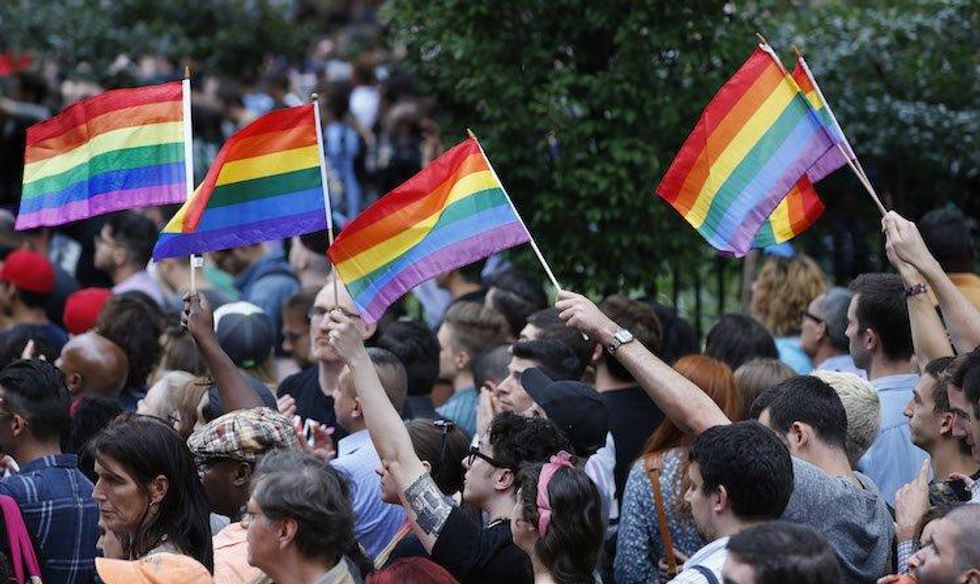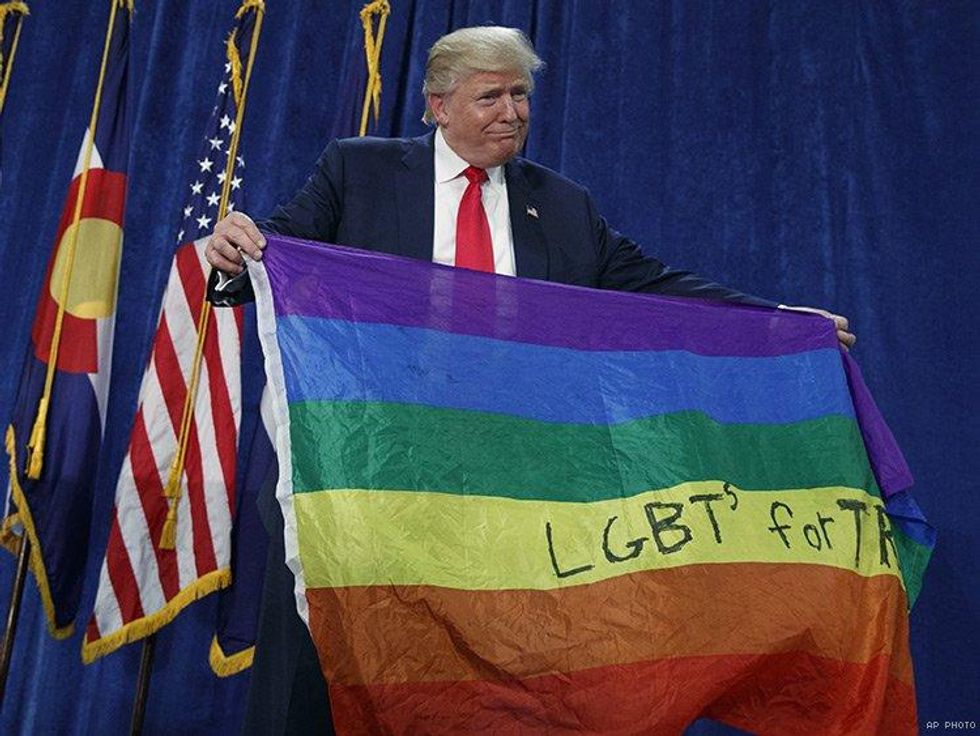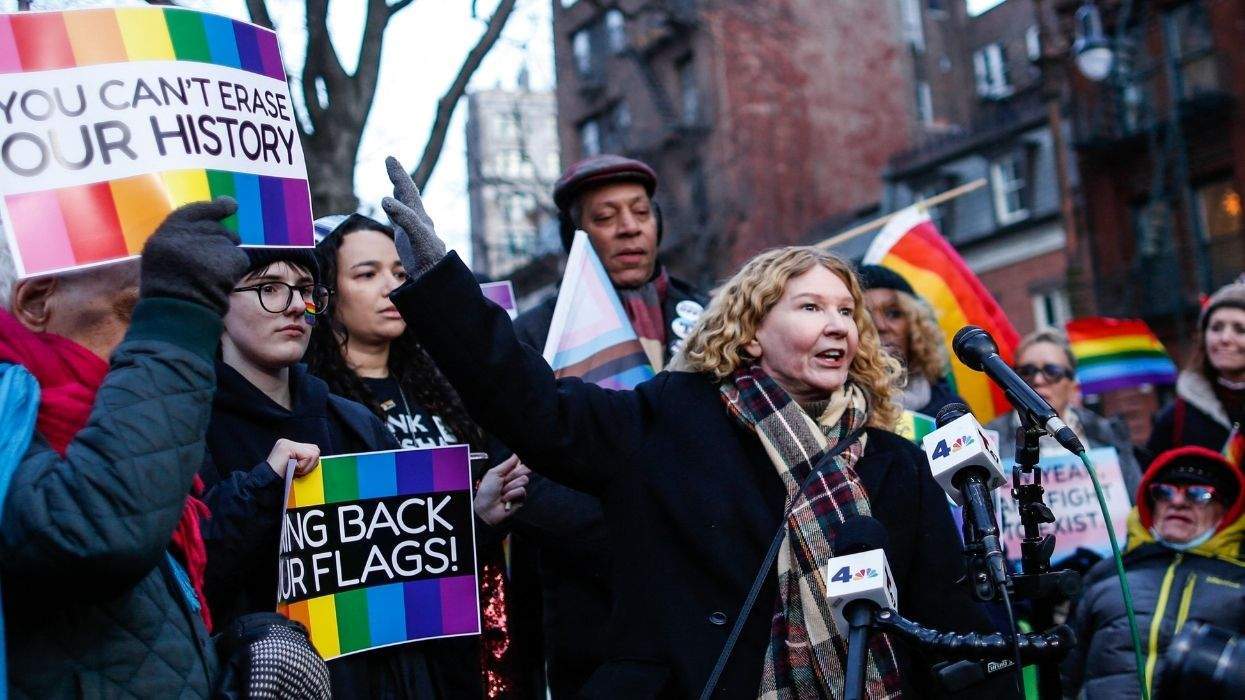My 15-year-old daughter cried all night after the election. Larry Kramer said this was a good first line. Larry had asked me to come over because he was in despair. I wanted to see Larry because I think that of all the people I have ever seen, he knows how to turn despair into action.
Larry is old, and this deepens his despair. "I am 82 and I feel it," he says. "I almost died twice." He does not have the strength to do what he did 35 years ago, when he screamed and wrote and screamed more about AIDS, until people listened, and then screamed again until they acted. Larry has a book to finish, the second volume of his novel The American People, and only so many hours of the day when he can work.
Photo by Benedict Evans.
He has a home health aide, and this, too, deepens his despair. The aide is a young man from Colombia. When he was a teenager, his parents paid someone to smuggle the boy into the United States. The smuggler took the money, raped the boy, and abandoned him. Before the boy got back to Colombia, he was interned in Mexico. Then he tried again, was conned by another smuggler, but in the end waded across the Rio Grande River, holding his clothes aloft over his head. This was a while ago. The young man has a Green Card now, an American husband, and a job with Larry, who adores him and encourages him to pursue his studies to be a fashion designer. Larry, who has a good record for spotting talent, says the young man has it. He will probably be all right--probably--but what breaks Larry's heart is the understanding that there are so many young people like him, who may not have their Green Cards or may not even have gotten to the United States yet.
That is what breaks my heart too. I have come to the United States as a refugee twice--once, 35 years ago, as a teenager, escaping Soviet antisemitism with my parents, and the second time, just three years ago, with my partner and children, escaping Vladimir Putin's anti-gay campaign. The American passport I got the first time around carried my family over the water the second time. Most people who have come to this country seeking refuge from homophobia aren't so lucky. They come here and ask for asylum. Most will probably be successful, but the process is long and confusing. Many people come to a big city like New York, where they can get free legal help and under-the-table work doing something like washing dishes, or washing floors, for the year--at least--that will elapse before they get their temporary work authorization (the wait for asylum status itself is usually a couple of years or more). Many of them are stiffed by their employers, who are certain of their impunity; some end up homeless. These are the lucky people. The less-lucky wind up isolated in a city where there is neither work nor legal or community resources. The really unlucky land in immigration detention facilities, places that are difficult for anyone, very difficult for gays and lesbians, and pure hell for trans people.
Immigration Equality, an LGBT organization, is currently working to try to help several score LGBT people who are in immigration detention facilities--and those are just the people who have been able to find this legal help for themselves. Immigration Equality also has roughly 500 pending asylum claims by LGBT people. Most of these come from Jamaica, with Russia in second place, Latin American countries including Mexico, El Salvador, Honduras, and Guatemala in third, and African countries including Nigeria and Uganda in fourth. Even though Immigration Equality has dozens of attorneys donating their time, waiting times for an initial interview for new arrivals reach into months. And those, again, are just the people who have been able to find Immigration Equality. LGBT people currently in the United States who are at various stages in the immigration process number in the tens of thousands. Many of them are now in a state of panic. Aaron Morris, executive director of Immigration Equality, told me that the organization is swamped with calls from people who want to rush to file their claims before a crackdown comes, but that there is also a second group: those who are so frightened that they want to go into hiding and not let the government know that they exist until it's over.
That's likely a terrible idea, especially because there is no telling when or whether "it" will be over, but the panic is well-founded. If there is one theme that ran through Donald Trump's entire campaign, one opinion on which he never wavered, it was his hatred of immigrants. He never actually uttered the word "asylum"--it may not be a part of his vocabulary--but he attacked refugees and immigrants, and he promised deportations and the wall. The fact that in the days after the election he softened his stance on the wall slightly is no comfort: whether the entire thing is built of brick and mortar, some of it is chicken wire, or in fact Trump just limits himself to a symbolic gesture toward America's already heavily fortified border with Mexico, he has made it clear that he will unleash a war on immigrants.
Photo by Glenn Garner.
He has the tools to make this a brutal war: the executive branch has control of immigration. Trump has promised to reverse President Obama's executive order creating DACA-- an acronym for "deferred action for childhood arrivals." He can do that with the stroke of a pen, instantly placing people who have lived in the United States most of their lives outside the law; they will then be subject to deportation. Trump's apparent pick for attorney general, Jeff Sessions, is known for his racist and homophobic views. Trump will also be able to fill roughly 85 federal-judge vacancies. Finally, Trump is inheriting a system that is already profoundly hostile to immigrants. The Obama administration deported more people than any administration in history: between 100 and 250 thousand people were forcibly removed from this country every year of his presidency. Now Trump wants to deport many more.
He has said that he will focus on the undocumented and those with criminal records, but that's just for starters--and hardly defines a clear category of people. "Undocumented" is not a legal term: it could apply to people who came to this country without permission, but it could also be interpreted to apply to those who have overstayed a visa or fallen "out of status"--say, came on a student visa but dropped out of their study program--and even to those who have already filed an application for asylum. Morris describes the status of someone who has filed an application as "better than nothing," but that's hardly firm protection. People who have already received asylum but have not yet become citizens are vulnerable too: their status is not hard to revoke. Green Cards offer no lifetime guarantee either: breaking the law can make you subject to deportation even if you have permanent-resident status. Specifically, "crimes of moral turpitude" can get you deported. This category of crime has no clear definition and is not related to the severity of the transgression--a misdemeanor can be seen as a "crime of moral turpitude," if the judge concludes that it was committed with intent to deceive. Are you thinking fraud? Think riding the subway without paying your fare. Which brings me to Trump's promise to remove only the "criminals. When you are an asylum seeker who has no legal right to work, when you run a high risk of going hungry and sleeping in a homeless shelter, you are also likely to jump the turnstile in the New York City subway. And then you are a criminal. Other grounds for deportation for legal permanent residents include going on public assistance for reasons that did not arise after arrival in the U.S. (think disability), or failure to inform the immigration authorities, in writing, of a change of address within 10 days of moving.
Queer people have been seeking refuge in the United States for decades, but in the last few years this migration has taken on a new urgency and a new quality, as countries such as Russia, Turkey, El Salvador, and Uganda--to name a few--have launched or intensified attacks on LGBT people while the U.S. proclaimed that gay rights are human rights. Marriage cinched the deal: even though the U.S. was roughly the twentieth country in the world to legalize same-sex marriage, it was gaining marriage rights in America that seemed to mean that progress was irreversible. Now, with a sworn foe of marriage equality as the vice-president-elect, many people are asking if marriage equality can be reversed. The answer is probably not, but it's the wrong question.
Reversing marriage equality is not impossible, but it would require at least one more vacancy on the Supreme Court, on the pro-marriage-equality side. What is not only possible but likely, though, is that we will begin to think about marriage differently under Trump. Seeking marriage equality was a brilliant legal and civil-right strategy: it worked so fast and applied so broadly that for many people it served as a shortcut to full citizenship. But the right to get married does not equal full citizenship. It is entirely possible to be married and systematically discriminated against.
Getting the right to marry felt like a watershed moment in part because it was accompanied by such swift change in public opinion that many--though by no means all--LGBT people experienced that we were being treated differently. In the last two decades, but especially in the last few years many--though by no means all--of us have felt safer looking, acting, and speaking differently from the straight gender-conforming majority. But marriage did not provide these protections: a shift in cultural norms did. These norms are not backed up by law. In most states in the country, it is legal to discriminate against people on the basis of sexual orientation or gender identity in both employment and housing. There are very few bans on discrimination in public accommodation. And "religious freedom" laws such as the one passed in Mike Pence's Indiana can allow many institutions such as, for example, hospitals, to discriminate legally. So you could be married and fired from your job for bringing your spouse to an office party, married and turned away from housing because you are married to a person of the same sex, married and refused entry to a restaurant for the same reason, and married and denied hospital visitation--one of the cornerstone rights in the argument for marriage equality.
Photo by Kathy Willens/AP.
The fairy-tale story of irreversible progress in LGBT rights is a very white American story. Americans of color have long known that progress is not linear. LGBT people from countries like Russia, Hungary, and Turkey, among others, can tell you what it feels like when attitudes make a U-turn. The laws in these countries are benign, compared to the many places in the world where homosexual behavior is punishable by imprisonment or even death, but that is cold comfort for people who find themselves exposed to prosecution and persecution, without a closet to hide in. As the global culture war in this area heated up over the last few years, as Pride parades in various parts of the world turned into battlegrounds, LGBT people have looked to America for comfort, protection, and small doses of human dignity.
During the Obama years American international aid agencies began helping LGBT organizations. The amount use for this purpose is not huge by international-aid standards-- about 7 million dollars a year--but for many foreign groups it is a lifeline. Not only is this funding likely to be cut, but there is the risk of renewed "faith-based" restrictions placed on aid to other groups, as was done during the George W. Bush years, to devastating effect. Then there was the help from individual American diplomats, who marched in contested Pride parades, offering very real protection simply by being there (the local police were then compelled to do their job and protect the marchers), or who invited LGBT activists to the Fourth of July party at the embassy, symbolically elevating them to the level of major political players among people who didn't normally even view them as human. American diplomats have also been on the front lines of the culture war in the United Nations, where a slow, plodding bureaucratic battle for recognition of the rights and dignity of LGBT people has been waged.
But more than anything else, the United States has served as a beacon of hope for LGBT people around the world. When my kids heard homophobic slurs in school every day, when those same slurs and worse were on Russian television every night, I could tell my kids that this was not normal--the American way was. They knew that we could come here and be safe--and we did, as did so many of our friends. I think this was why my daughter cried so hard all night after the election.
Of course, Trump is said to have gay friends. He has sounded out the letters L-G-B-T-Q and has draped himself in a rainbow flag. There is even the rumor that he might pick Richard Grenell, who is gay, as his ambassador to the UN (though it's possible that this rumor results solely from Grenell's own lobbying for the position).* That would make Grenell the first openly gay person in a cabinet-level position. So some people are saying that there is no reason to panic: after all, Trump is from New York City and progress is irreversible. They think that LGBT people are exempt from the wave of hate enabled by Trump's election. They are wrong.
That is one of the reasons I went to see Larry. I remembered how, in the 1980s, he insisted precisely on panicking. He wrote hysterical articles for the New York Native, a gay paper. He used words like "genocide" and "Holocaust." Now we sit in the living room of his Greenwich Village apartment, where Gay Men's Health Crisis, the first AIDS support group (before "AIDS" was a word) was founded in 1981. Two years later Larry got kicked out of GMHC--for panicking.
"People said, 'It's just 40, or 50, or 60 people--no reason to stop having sex.' I said, We have to cool it. They said, 'But what if it doesn't turn out to be a virus?' I said, Then you don't have to cool it, but for now, do it! And I was saying we have to go after the mayor, who we knew was gay - and he wouldn't let his health commissioner put out recommendations. I got thrown out - that hurt."
How did he keep going? He just did. "Things people said about my panicking didn't frighten me. They made me angry. I didn't know I had this anger in me...So I wrote about it, I spoke whenever I was asked, I was a pariah, people crossed to the other side of the street when I was coming. It's not that it didn't bother me, it's that I found it all fascinating--I guess it's the writer in me. It took me from'83-'84, when I got thrown out of GMHC, till '88 to get people to support this kind of effort"--meaning ACT UP, a mass angry direct-action movement.
In AIDS mythology, it looks different: Larry gave a speech at the Gay and Lesbian Community Center one day, and ACT UP was born. Even in my recollection the amount of time it took for Larry's panic to be translated into mass action had collapsed to maybe a year or two. But in fact it took five years. We don't have five years now. We don't even have a year or two.
"It's the early days of AIDS all over again," says Larry. "I didn't think that would ever happen. It makes you want to cry sometimes."
Masha Gessen is a journalist, LGBT activist, author of The Man Without a Face: The Unlikely Rise of Vladimir Putin.
*Trump has since appointed Nikki Haley as U.N Ambassador.


